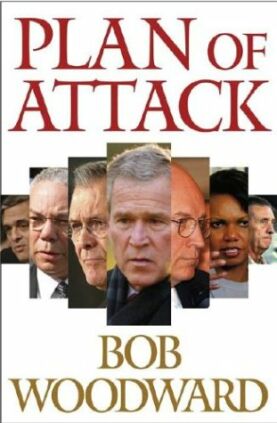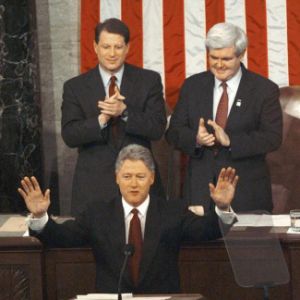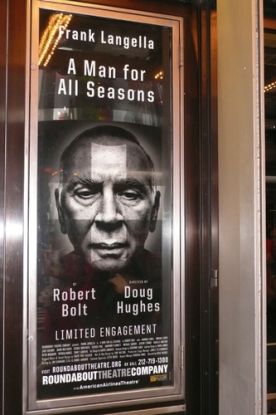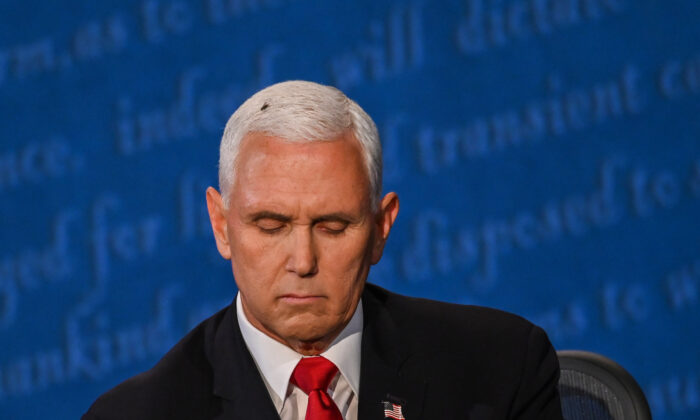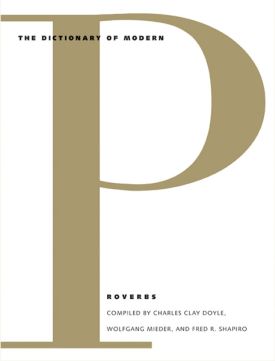Oh, the Irony!
From The New CriterionThere is a great movie moment in Carol Reed’s Night Train to Munich of 1940, a tale of Germany at the onset of the Second World War and the attempt by a dashing secret agent, played by Rex Harrison as a sort of James Bond avant la lettre, to spirit out of the country a Czech professor with vital information about a new armor-plating technology — and his beautiful daughter — after they have been kidnaped by Nazis. At one point, a Nazi guard is interrogating a lowly clerk. “It’s been reported to me that you’ve been heard expressing sentiments hostile to the fatherland,” says the guard. “I warn you, Schwab, this treasonable conduct will lead you to a concentration camp.”
“But, sir,” says the clerk. “What did I say?”
“You were distinctly heard to remark, “This is a fine country to live in.”
“Oh, no sir,” says the clerk, sounding relieved. “There’s some mistake. I said, ‘This is a fine country to live in.’”
The guard is taken aback. “Are you sure?” he asks.
“Yes, sir,” answers the clerk.
“I see. Well, in future, don’t make remarks that can be taken in two ways.”
It’s almost a truism, at least in English-speaking countries, that totalitarians and other tyrants lack a sense of humor. Also, that bullies are generally too stupid to understand irony. In this case, however, it’s just because the bully does understand irony — at least to the extent that he knows it consists of “remarks that can be taken in two ways” — that he is made to look an idiot: first, because every remark can be taken in (at least) two ways, depending on the context, and, second, because he allows a weaker person to take advantage of his social insecurity to turn the tables on him. For the guard knows his disadvantage vis á vis his victim is that the latter understands the context of his remark while he does not. If others understand it too, he will appear a fool in their eyes for taking it the wrong way, so he allows himself to be led back to a benign interpretation of words that were not intended benignly.
The episode is a perfect illustration of Czeslaw Milosz’s dictum that irony is “the glory of slaves,” and a revenge of the powerless upon the powerful. But this revenge depends on something like that guard’s insecurity. The powerful have to care how they appear in the eyes of those they exercise power over — something that doesn’t happen in real life quite so often as it does in the movies. Speaking of Nazis and trains, for example, in John Frankenheimer’s The Train of 1964, Burt Lancaster is hiding out in the wine cellar of the station hotel when the Nazis come calling in search of him. As Jeanne Moreau emerges from the cellar with two bottles of wine, the Germans ask her if she has seen him. “Yes, yes, of course I have,” she says, gesturing toward the open door from which she has just emerged. “I’m keeping him in the wine cellar.” The Nazis turn away, leaving the cellar unsearched. Obviously, it must matter to them if this Frenchwoman thinks them too stupid to know when she is being ironic — as, ironically, she obviously does.
Irony can also be a weapon of the powerful, however. At least it can when the powerful are blessed, as President Obama is, with a certain prestige to go with their power. Take the e-mailed warning by presidential adviser Gene Sperling to Bob Woodward that he was going to “regret” having written in The Washington Post that the President had been less than entirely truthful in claiming that the idea for the “sequester” — I use the now-universal journalistic shorthand for a sequestration of funds as mandated in last summer’s deal between the White House and the Republicans over the budget ceiling — had not come from the White House. Commendably, in my view, Mr Woodward had not accused Mr Obama of lying, but he had included this statement as an example of “misunderstanding, misstatements and all the classic contortions of partisan message management.” This was presumably taken by Mr Sperling, as it was by many of the President’s conservative detractors, as tantamount to a charge of lying, and he admitted to having raised his voice in a telephone conversation with Mr Woodward before sending the e-mail mentioned earlier.
This, for some reason, Mr Woodward took to Politico, which then reported that he had repeated to its reporters, who happened to be his former Post colleagues Mike Allen and Jim VandeHei, the e-mail’s relevant sentence: “I think you will regret staking out that claim.”
“‘You’ll regret’? Come on,” [Woodward] said. “I think if Obama himself saw the way they’re dealing with some of this, he would say, ‘Whoa, we don’t tell any reporter ‘you’re going to regret challenging us.’ They have to be willing to live in the world where they’re challenged,” Woodward continued in his calm, instantly recognizable voice. “I’ve tangled with lots of these people. But suppose there’s a young reporter who’s only had a couple of years’ — or 10 years’ — experience, and the White House is sending him an e-mail saying, ‘You’re going to regret this.’ You know, tremble, tremble. I don’t think it’s the way to operate.”
I quote so much of the context just so as to make it clear why Messrs. Allen and VandeHei claimed that Mr Woodward had been “making clear he saw it as a veiled threat.” I think that any reasonable person would have taken the same view. Yet Mr Woodward instantly engaged in a bit of “message management” of his own, denying that he had claimed to have been threatened and insisting that it was Politico’s misunderstanding and misstatement to have written otherwise. As he told his current Post colleague, Paul Farhi,
he stands by the idea that Sperling’s language was over the line but stops short of suggesting outright intimidation. “I never characterized it as a ‘threat,’” he said. “I think that was Politico’s word. I said I think [Sperling’s] language is unfortunate, and I don’t think it’s the way to operate. . . . [Sperling’s] language speaks for itself. I don’t think that’s the way to operate.”
Oh, the irony! He criticizes the President for denying that he had said what he clearly had said and, in the course of further denials, the President induces him to say something, equally clearly, that he subsequently finds it convenient to deny having said. Could it be only coincidental that the President’s initial misstatement — in one of his debates with Mitt Romney last October — was forgotten in all the journalistic fuss over who had reported whom correctly? Certainly, it was far from being the first time that the media had turned a political story into a story about the media.
Of course, in subtly suggesting that Mr Sperling’s e-mail had contained a “veiled threat,” Mr Woodward had himself been guilty of (at the least) a misinterpretation, or so it seemed to most people when, subsequently, Politico published the entire e-mail. It begins with Mr Sperling’s apology for raising his voice in the earlier telephone conversation and an acknowledgment that “perhaps we will just not see eye to eye here.” Then he goes on:
But I do truly believe you should rethink your comment about saying that POTUS asking for revenues is moving the goal post. I know you may not believe this, but as a friend, I think you will regret staking out that claim. The idea that the sequester was to force both sides to go back to try at a big or grand bargain with a mix of entitlements and revenues (even if there were serious disagreements on composition) was part of the DNA of the thing from the start. It was an accepted part of the understanding — from the start. Really. It was assumed by the Rs on the Supercommittee that came right after: it was assumed in the November- December 2012 negotiations. There may have been big disagreements over rates and ratios — but that it was supposed to be replaced by entitlements and revenues of some form is not controversial.
That this is not a threat is just about as clear as Mr Woodward’s later claim to Politico — still later, denied by him — that it is. As in the case of Herr Schwab, the meaning is unambiguous in context but, taken out of context, is open to ironic re-interpretation to suit the speaker’s purposes. Mr Woodward, we may remember, is a man so confident of his ability accurately to transcribe the meanings of his interviewees that he does not scruple to put their words in quotation marks even when it is clear — as clear as Mr Sperling’s non-threatening e-mail — that he has not been in a position to record or write down their exact words. As Gregg Easterbrook wrote in 2004, “Woodward and his editors have cheapened the quotation mark, changing its meaning from ‘what was said’ to ‘whatever sounds about right’.”
That was written about his book Plan of Attack, which purported to describe the origins of the Iraq War and about which I wrote in this space at the time (see “Not Made Up but Unmade” in The New Criterion of June, 2004). On that occasion, it struck me that the Great Reporter, Bob Woodward, was not really very interested in the Iraq War or the Bush administration as a historian would have been interested in them. Rather, he was searching through the minutiae of the White House gossip he had collected for his next Watergate — or at least for some indiscretion of office politics, some hint of hypocrisy or incompetence directed by one administration official against another, that would make a headline. The implied context was that of scandal even then, and became much more so by the time he got to State of Denial two years later. But this was not the classic scandal of malfeasance and cover-up. It was instead merely a media consensus that, when things went badly in Iraq, someone must be to blame — someone whom it then became the media’s job to expose. Mr Woodward, as the Great Exposer, then sought to supply, through exhaustive reporting, the odd confirmatory fact for this media-generated pseudo-scandal.
We need hardly add that the task was made easier for him by the same sort of manipulation of context that he engaged in with Gene Sperling. This made his reporting of less interest in its detail — which was typically both overwhelming in quantity and trivial in importance — than in its indication of where the consensus was at any given moment. And so it proved in February. For, implausible though the threat of Mr Sperling’s words may have been, there was instant support from other journalists and commentators — some, including Ron Fournier of National Journal, claiming to have been threatened themselves by the Obama White House. It quickly became apparent, however, that these people, like Bob Woodward himself, were rushing to join the consensus as it was on the point of changing. The change was symptomatic of a larger shift in public opinion as a result of the administration’s attempts to oversell the looming disaster it saw as a result of the sequester.
The way the wind was blowing was made apparent by the day after the dawning of the sequester on the first of March when “Saturday Night Live,” usually as reliably pro-administration as the rest of the media, ran an opening sketch ridiculing Mr Obama’s attempts to go over the heads of Congress in order to raise the alarm. Jay Pharaoh as the President greeted the audience by saying, “Now most Americans don’t understand what this whole sequester means. I could explain it in financial terms or human terms. But since I really have no idea about how money works or how budgets work, I’ll go with human terms instead” — the human terms consisting of a procession of those supposedly devastated by the budget cuts, including an air traffic controller who said that her radar screen now wouldn’t work until she had watched a Doritos commercial and a border agent who said he was now letting every tenth Mexican into the country unmolested.
Unlike Mr Woodward’s vicarious sense of intimidation on behalf of some anonymous “young reporter,” this shift in the media world’s support for Mr Obama, short-lived though it was likely to be, really was news — if news which was slow to trickle down to most of the news media themselves. Still, only three days into the budgetary Armageddon, The New York Times was just going through the motions by headlining: “As Automatic Budget Cuts Go Into Effect, Poor May Be Hit Particularly Hard.” May be? Surely, the Times ought to be able to do better than that? The lead of the piece was actually an assurance that “the $85 billion in automatic cuts working their way through the federal budget spare many programs that aid the poorest and most vulnerable Americans” (emphasis added). So that’s all right then, presumably.
The White House itself was among the first to become aware of the change in the media environment and made a rapid adjustment, as was suggested by its own sudden shift from alarmism over the sequester to insistence, as it became clear that it was actually going to happen, that most people would not feel the effects of it until much later, if at all. It was an astonishing volte face, though it appeared to have escaped the notice of most of the media. By the time of the dinner of the Gridiron Club just over a week later, President Obama, decked out in a white tie and an unusually jovial manner, was joking about Bob Woodward and the sequester with equal insouciance — and, unlike the rest of the dinner’s speakers, for the record. Here’s a selection from the transcript of his speech (with the “laughter” points helpfully added) which the White House made available to the media:
We noticed that some folks couldn’t make it this evening. It’s been noted that Bob Woodward sends his regrets, which Gene Sperling predicted. (Laughter.) I have to admit this whole brouhaha had me a little surprised. Who knew Gene could be so intimidating? (Laughter.) Or let me phrase it differently — who knew anybody named Gene could be this intimidating? (Laughter.)
Now I know that some folks think we responded to Woodward too aggressively. But hey, when has — can anybody tell me when an administration has ever regretted picking a fight with Bob Woodward? (Laughter.) What’s the worst that could happen? (Laughter and applause.)
But don’t worry. We’re all friends again in the spirit of that wonderful song. As you may have heard, Bob invited Gene over to his place. And Bob says he actually thinks that I should make it too. And I might take him up on the offer. I mean, nothing says “not a threat” like showing up at somebody’s house with guys with machine guns. (Laughter.)
It’s perhaps a little less hilarious on the page than it must have been in person, but we can still see how, through the magic of irony, a vanishingly insignificant remark by a person in a position of power has been transformed to the first stirrings of Nixonian malignity and then back again to a joke with nothing about it changed save the context — and the will of those whose business it is to manipulate contexts to see it as one thing or the other.
Less was said on this occasion about the sequester, but there, too, what two weeks earlier had been a looming catastrophe for the country and the economic recovery was now a joke. The President even echoed the “Saturday Night Live” sketch a week earlier by saying that his “joke writers have been placed on furlough. (Laughter.) I know a lot of you reported that no one will feel any immediate impact because of the sequester. Well, you’re about to find out how wrong you are. (Laughter.)” This, he said, was just one of the “major challenges” and “tough decisions” on which “I have my top advisors working around the clock. After all, my March Madness bracket isn’t going to fill itself out. (Laughter.) And don’t worry — there is an entire team in the situation room as we speak, planning my next golf outing, right now, at this moment. (Laughter.)”
Naturally, he was praised by the usual acolytes for his “self-deprecating” humor, but there was something a good deal more than self-deprecation in this speech. In several of its jokes there was a mocking awareness of how the media function and, in particular, of how they manufacture scandal to suit their own political purposes. Thus he told the Gridiron diners that David Corn of Mother Jones magazine was among those present. “He brought his iPhone,” he added. “So, Bobby Jindal, if you thought your remarks were off the record, ask Mitt Romney about that. (Applause.)” He was alluding, of course, to the “Forty-seven per cent” remark at a closed fund-raiser whose publication by a Woodwardian scandal hunter was widely thought to have cost Mr Romney the election. But that was also a reminder of the President’s own brush with political mortality four years earlier — about which he also had something to say.
Of course, maintaining credibility in this cynical atmosphere is harder than ever — incredibly challenging. My administration recently put out a photo of me skeet shooting, and even that wasn’t enough for some people. Next week, we’re releasing a photo of me clinging to religion. (Laughter and applause.)
Being cynical about cynicism is admittedly a hard thing to pull off, but to me there is a kind of insolent arrogance in Mr Obama’s confession to the media that he is engaged in an effort at media manipulation — and being (as he no doubt expected he would be) applauded by the media for it. Like the German soldiers looking for Burt Lancaster in The Train, the media chose to treat this as a joke, but what else could they do? The shame of admitting that they have been during the Obama presidency even more manipulated than manipulating would, I imagine, have been just too much for them to bear.
Discover more from James Bowman
Subscribe to get the latest posts to your email.


